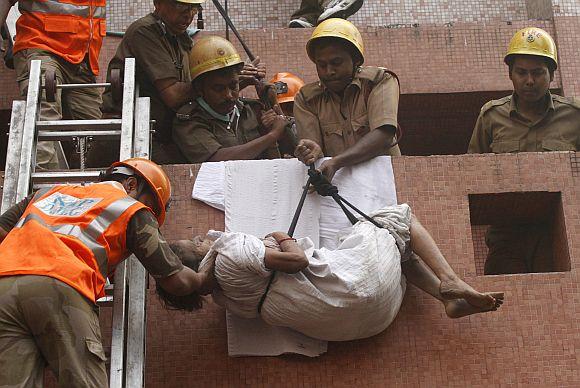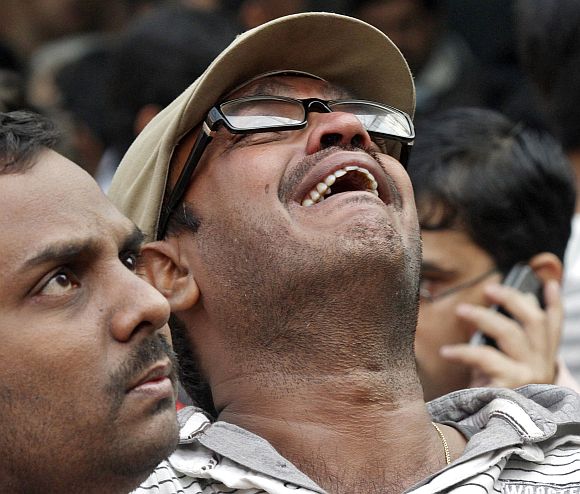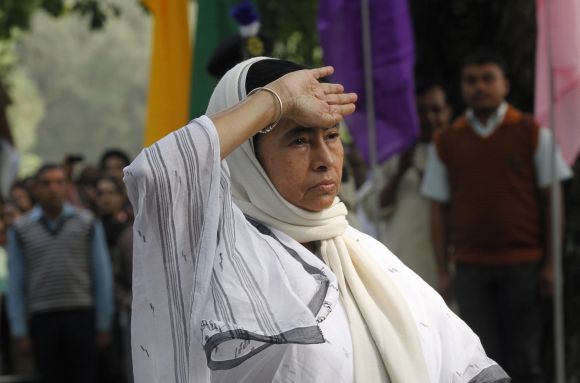
There is little doubt that Calcutta high court's recent decision to release R S Agarwal, one of the directors of AMRI hospital, on bail would further magnify the extreme puzzlement of the victims, and ordinary people, over the horrendous fire that killed 90 patients in December last, writes Dr Kunal Saha.
The Calcutta high court has granted bail to R S Agarwal, one of the directors of AMRI hospital in Kolkata where more than 90 patients perished from suffocation as a result of a devastating fire last December.
Agarwal was arrested alongwith other top leaders of the AMRI hospital for an act of criminal negligence that allegedly triggered this unprecedented hospital fire causing en masse death of patients.
Patients dying from reckless or negligent act by the doctors and hospitals in India are hardly considered as shocking news these days.
But the sheer magnitude of this recent medical catastrophe resulting from a virtual absence of fire safety regulation in a pricy private medical centre like the AMRI hospital stunned the entire nation.
Please ...
Click here for more Realtime News on AMRI hospital fire!

While the newly elected West Bengal government led by charismatic Chief Minister Mamata Banerjee sprung into action and promptly arrested almost all of the top administrative executives including all members of the AMRI board of directors, a deluge of conflicting reports by the media over the past two months have left ordinary citizens still befuddled about the exact nature of the guilty individuals for this unparalleled medical fiasco in Kolkata.
There is little doubt that high court's decision to release Agarwal on bail while refusing to allow bail for other members of the AMRI board would further magnify the extreme puzzlement of ordinary people.
It is reported that Agarwal's bail was approved by the high court primarily because he was not associated with the day-to-day affairs of the AMRI hospital for the past one year.
Does this mean that other board members were actually involved with the day-to-day activities of the hospital? It is unlikely that the top administrators in the AMRI board of directors, who are known to be wealthy and successful entrepreneurs in the society, would be occupied with regular day-to-day work in the hospital.
It is also not very likely that the large number of board members, who must also be busy with their regular professions, can meet every day to discuss daily affairs of the hospital. The board members perhaps met not very frequently to converse day-to-day affairs of the hospital.
Of course, the board of directors must always be well-informed about the regular activities in the hospital by other paid employees. More importantly, all board members should be well acquainted with the standard of the basic infrastructure of the hospital that must also include the preventive measures in place for fire safety.
It is difficult to imagine that a member who is in the board of directors had no knowledge about the basic infrastructure of the hospital even if he did not regularly attend the formal meetings for one year. Is it believable that the same AMRI hospital had all the necessary preventive measures in place only one year earlier?
The absence of adequate fire safety measures at the AMRI hospital was likely to be a chronic problem (which was overlooked all this time) waiting for a fiery accident to erupt -- unfortunately, the tragic accident eventually took place last December.

There can be no dispute that the members of the AMRI board should be held accountable for failure to protect the vulnerable patients from fire if they are found guilty after a fair trial in the criminal court.
But since Agarwal was granted bail because he did not attend board meetings for one year, should another member who might not have attended meetings for 10 months, six months or three months may also claim for a favourable treatment by the judiciary? How long a member needs to be without any direct participation in the board meetings in order to be considered not liable for the negligent failure by the hospital?
Another complicated situation emerges from the selective permission for Agarwal to be released on bail. While it is clear that the high court was considering an application only for bail for the board members who were already imprisoned and waiting for the criminal trial to begin, granting bail only for Agarwal, not for his poor health condition but on a ground which is connected directly with the underlying merit of the case, the high court has sent an unmistakable message that may pave a favourable way for Agarwal to sail through the impending trial in the lower court.
During the upcoming trial, Agarwal may now certainly claim that he was differently situated than other board members for the alleged crime as the high court has found.

The excruciating pain and fear under which more than 90 defenseless patients succumbed to the ghastly fire at the AMRI hospital that should have never happened are virtually impossible for us to imagine.
Almost equally impossible for us to appreciate the exact and intense level of grief and agony that the friends and family members of those who perished have been going through since the fire broke out at AMRI hospital more than two months ago.
There is no argument that high court's nod for a bail for Agarwal would further heighten the level of angst for these hapless "living" victims of negligence by AMRI hospital.
Until now, a paltry compensation of Rs 5 lakh has been promised by the government for each patient who died from the fire at the AMRI hospital. One must not be oblivious of the undeniable fact that this horrendous medical atrocity took place not in any government hospital or small nursing home but in AMRI hospital, one of the premier private hospitals in Kolkata where the cost for treatment of an ordinary ailment may easily run in multiple lakhs of rupees.
In fact, it would not be far-fetched imagination to think that most of the patients who died from this horrifying medical disaster at the AMRI hospital would come from the upper class of our society.
Indeed, it is ironic for a patient who perhaps got admitted himself at the AMRI hospital to get rid of a routine medical condition after gleefully agreeing to pay lakhs of rupees for treatment to end up eventually losing his life in the most gruesome manner.
And even more shocking is the fact that for this heinous crime by a rich hospital, his inconsolable family may be paid a measly sum of Rs 5 lakhs. This cannot be viewed as "justice" in any way you look at it.
While fighting a case for adequate financial compensation from AMRI hospital on an individual basis may continue for decades under the legal quagmire in the consumer courts, a just and timely criminal conviction of the guilty individuals may bring some justice and solace to the aching hearts of those who lost their loved ones in the tragic fire at AMRI hospital.
Unfortunately, granting of bail for Agarwal by the high court even before any charge-sheet was filed by the government investigators is not likely to kindle any new ray of hope for these ill-fated "living" victims of our grossly flawed medical system.
People of West Bengal and India would wait with bated breath for the ultimate day of justice for the unfortunate souls that had to depart this earthly world from a terrible medical tragedy only because AMRI hospital trampled over the fundamental rules for protection of the innocent patients.
...